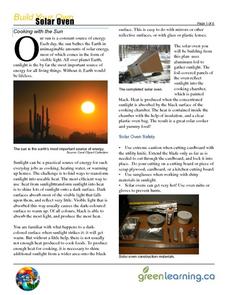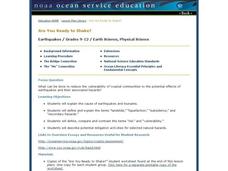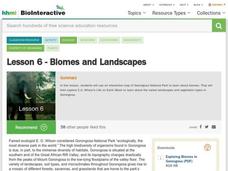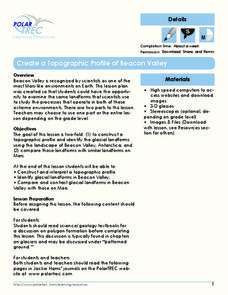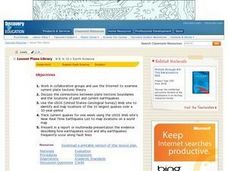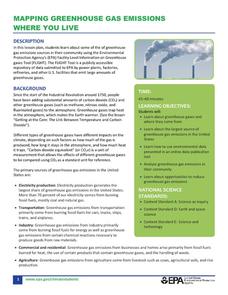University of Wisconsin
Noting Notable Features for Rain Gardens
Eight groups in your class are each responsible for a different aspect of surveying the campus for a suitable rain garden location. Features to consider include water flow, topography, sun/shade patterns, land surface, vegetation,...
Curated OER
Voyage: A Journey Through Our Solar System
Thoroughly written, this plan walks you through every detail of having your high school astronomers design scale models of the solar system. Complete instructions on building to scale, lesson procedures, and associated worksheets are all...
Green Learning
Build Your Own Solar Oven
This is not exactly a lesson plan, but rather a six-page document detailing how to build a solar oven. A bit of background information, materials list, diagrams and photos, and clearly-written procedures are all included. There are no...
NOAA
Ocean Layers I
How is it possible for ocean water to have layers? The sixth installment of a 23-part NOAA Enrichment in Marine sciences and Oceanography (NEMO) program investigates factors that cause different water densities to occur. Experiments...
Florida International University
Design Your Own
Apply scientific principles to designing an experiment to study organisms living on the coral reef in our oceans. Through reading, individuals learn about the coral reef ecosystem and important factors that affect its function. Using the...
University of Wisconsin
Sizing a Rain Garden
Most appropriate if you are applying the entire unit to build a rain garden at your school, this installment involves calculating the area that will drain into it. Your garden planners will need data from previous lessons, so this one...
Curated OER
Native Planting for the Built or Green Environment
Students identify the terms used in naturescaping. They identify how to plant, how to do site preparation and how to develop a plan. Students explore the benefits of naturescaping for the health of the environment. They also...
Curated OER
Radiation Comparison Before and After 9-11
Using the NASA website, class members try to determine if changes could be detected in cloud cover, temperature, and/or radiation measurements due to the lack of contrails that resulted from the halt in air traffic after the attacks of...
Curated OER
Soil Comparison and Analysis
Students perform tests on different soil samples. In this earth science lesson, students classify the soil into groups according to test results. They write a lab report following a certain criteria.
Curated OER
Are You Ready to Shake
Young scholars examine earthquakes and tsunamis. In this Earth science lesson, students investigate the causes and hazards associated with earthquakes and tsunamis.
Curated OER
Environment -- Unit on Globalization and the Environment
Students examine the effect of human activities on the environment. They discover issues that are causing problems around the world. They participate in a debate using their own research.
Howard Hughes Medical Institute
Lesson 6: Biomes and Landscapes
Aside from the amazing animals in Gorongosa National Park, what else is there to discover? The sixth installment in an eight-part themed series contains an interactive map where scholars can learn more about the geographic features of...
Polar Trec
Create a Topographic Profile of Beacon Valley
Landforms in Beacon Valley, Antarctica, where there is no snow, bear a striking resemblance to landforms found on Mars. Scholars identify landforms found in Beacon Valley through analysis of topographic maps in the activity. They then...
Curated OER
Scarcity of Water Throughout the World
Students identify the various forms of fresh water on the earth. They observe a demonstration aand read articles that show them the importance of water conservation. They write a journal about their opinion regarding paying for water.
Curated OER
ESRI Live Earthquake Site
Students examine a World map and find earthquakes near plate boundaries. They locate and describe earthquakes in the United States and California.
Curated OER
Looking Back in Time
Students construct a timeline that records the birthdates of several scientists. They calculate a relationship for distance and years and then compare their timelines to the use of light years as a measurement unit.
Curated OER
Earthquakes And Fault Lines
Students discuss major causes of earthquakes and identify famous fault lines, access and map information about ten largest earthquakes in world from 1989 to 1998, and theorize about location of these earthquakes as they relate to Earth's...
US Environmental Protection Agency
Mapping Greenhouse Gas Emissions Where You Live
After investigating the US Environmental Protection Agency's climate change website, your environmental studies students discuss greenhouse gas emissions. They use an online interactive tool to look at data from power production...
Beyond Benign
Ecological Footprint
How does your lifestyle measure up in terms of your ecological footprint? Young ecologists examine their impact on the planet using an insightful online calculator. A short quiz asks users to rank the size of their homes, their energy...
Colorado State University
Can Energy Be Created or Destroyed?
Energy doesn't come out of nowhere! An engaging lesson has learners investigate energy as it transforms from one type to another. They collect data to prove that energy is not lost as it changes.
Chicago Botanic Garden
Review and Assessment: Causes and Effects of Climate Changes
The last activity in the series of five is a short one where individuals show what they've learned about the causes and effects of climate change. Working independently, they fill in a graphic organizer, then compare their notes with a...
American Museum of Natural History
Going, Going...Gone?
Young environmentalists consider how scientists are attempting to save endangered species. They read about what causes extinction and steps to take to minimize the threats.
Curated OER
Powering a Green Earth
Students compare and contrast renewable and nonrenewable energy. In this environmental science activity, students discuss the importance of going green. They identify the different components in a power grid system.
Curated OER
Culminating Alternative Energy Project
Young scholars work in teams to complete an alternative energy project. In this alternative energy lesson, students are assigned a city and decide on the most appropriate alternative energy source for their city. Young scholars use maps...




